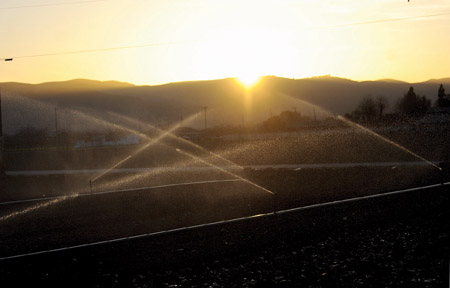Officials hope the state order urging San Juan Bautista residents to avoid drinking tap water could be lifted by the start of fall but might stay in effect until spring of 2015, a deadline set to meet the safe standard for nitrates in drinking water.
City Manager Roger Grimsley provided an update Monday on the situation in San Juan Bautista, where residents since May have been told to stay away from tap water due to high nitrate levels. Those high nitrate levels can come from such causes as agricultural or septic runoff, while San Juan officials expect to drill two new wells – deeper than the current two wells with nitrate issues – in order to lower the contamination levels to a safe standard.
High nitrate levels are particularly dangerous to pregnant women and infants, according to city warnings.
The city does monthly testing and submits it to the state’s regional water board. In July, those tests came back at respective measurements of 39, 40 and 43 milligrams per liter of nitrate, close to the maximum standard of 45 previously exceeded in San Juan, spurring the state order.
Grimsley on Monday said city officials are hoping rains from the upcoming winter help to dilute the nitrate levels, which the city has partially attributed to drought conditions.
“When it starts to rain, you get better quality,” the city manager said.
Grimsley explained that the state compliance order requires the city to have a permanent solution in place by March 2015. He hopes the state lifts its order before then – the restriction bars restaurants and other enterprises in town to serve or sell tap water – and possibly before the start of the heavy rainy season.
He said city officials are adjusting their strategy – they previously focused on installing an ion exchange system as the primary solution, but that became too expensive – and expect to drill wells “a couple hundred feet” down. Most nitrate contamination happens within 150 feet of the surface in shallow wells such as the ones used by San Juan, he explained, while the city will focus on providing a better underground seal on the new wells in order to prevent contamination.
Although San Juan has dealt with high nitrate levels for years in its groundwater wells, this year has been particularly bad, city officials have contended. Grimsley said he is hopeful that changing industry trends toward more organic production – with operations such as Earthbound Farm in the area – will mean less nitrate contamination with time.
For business owners such as Dennis Cole at Pizza Factory in San Juan Bautista, the city’s response has been inadequate. Cole has criticized the city for not doing enough when it knew about the nitrate problem “well over a year ago” and is paying the price now. He went ahead and took action on his own, purchasing a nitrate exchange system that arrived last Friday and should be installed within the week.
“I’ve had to buy a nitrate exchanger here for the restaurant because I can’t continue going on waiting for the city,” Cole said.
He said city leaders aren’t focused enough due to all their problems, including legal issues over recently rescinding a ban against formula businesses.
“They’re not really focused on helping the businesses and the citizens,” Cole said, adding that the city can’t move forward despite tests below the 45 milligrams per liter level. “They (the state) are not going to lift the ban until the city actually does something to correct the problem.”










